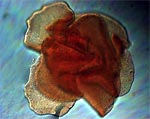 The sole representative species of the phylum Placozoa, Trichoplax adhaerens represents the simplest known animal, with the smallest known animal genome. The DNA sequence of the 50-Mbp Trichoplax genome will have far-reaching scientific importance, providing significant genomic insights into our understanding of how animal life evolved. This genome will have enormous utility to the scientific community, becoming the standard basal group for the comparative analysis of animal genomes, genes, and biological processes. Researchers who study the lower metazoans will clearly benefit, as will the bioinformatics and comparative genomics community. Prospects for future funding of functional annotation, microarrays, and evolutionary genomic studies are excellent, and available biological resources include established laboratory cultures, high-quality genomic DNA, arrayed fosmid and full-length cDNA libraries. A Trichoplax genome will make it possible to determine the gene and proteome content of the simplest known animals and provide the first genomics platform in a simple multicellular system.
The sole representative species of the phylum Placozoa, Trichoplax adhaerens represents the simplest known animal, with the smallest known animal genome. The DNA sequence of the 50-Mbp Trichoplax genome will have far-reaching scientific importance, providing significant genomic insights into our understanding of how animal life evolved. This genome will have enormous utility to the scientific community, becoming the standard basal group for the comparative analysis of animal genomes, genes, and biological processes. Researchers who study the lower metazoans will clearly benefit, as will the bioinformatics and comparative genomics community. Prospects for future funding of functional annotation, microarrays, and evolutionary genomic studies are excellent, and available biological resources include established laboratory cultures, high-quality genomic DNA, arrayed fosmid and full-length cDNA libraries. A Trichoplax genome will make it possible to determine the gene and proteome content of the simplest known animals and provide the first genomics platform in a simple multicellular system.
CSP project participants: Stephen L. DellaPorta (proposer) and Leo Buss (Yale Univ.), Dan Rokhsar (proposer, JGI), Bernd Schierwater (Divison of Ecology and Evolutution,Tieraerztliche hochschule, Germany), Rob DeSalle (American Museum of Natural History), Peter Holland (Univ. of Oxford), and George Weinstock (Baylor College of Medicine).